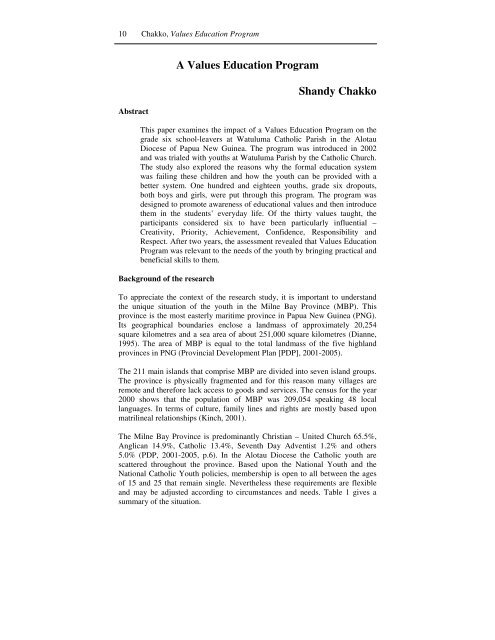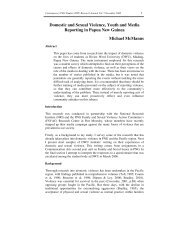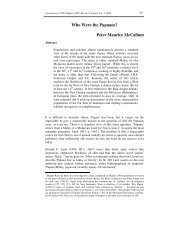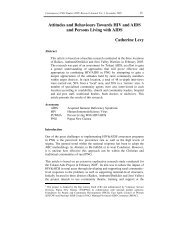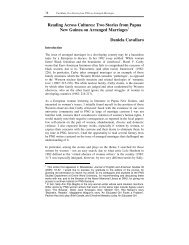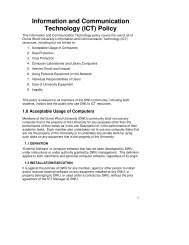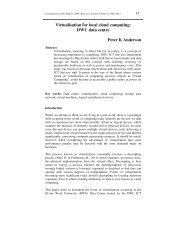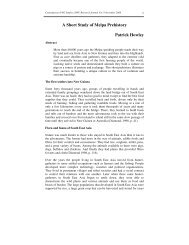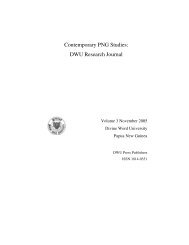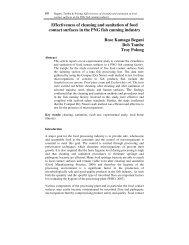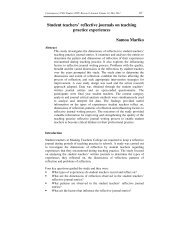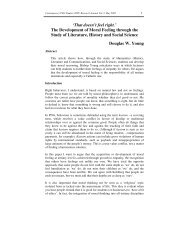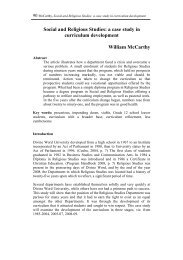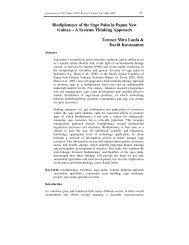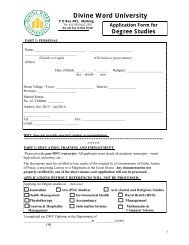A Values Education Program Shandy Chakko - Divine Word University
A Values Education Program Shandy Chakko - Divine Word University
A Values Education Program Shandy Chakko - Divine Word University
You also want an ePaper? Increase the reach of your titles
YUMPU automatically turns print PDFs into web optimized ePapers that Google loves.
10 <strong>Chakko</strong>, <strong>Values</strong> <strong>Education</strong> <strong>Program</strong>AbstractA <strong>Values</strong> <strong>Education</strong> <strong>Program</strong><strong>Shandy</strong> <strong>Chakko</strong>This paper examines the impact of a <strong>Values</strong> <strong>Education</strong> <strong>Program</strong> on thegrade six school-leavers at Watuluma Catholic Parish in the AlotauDiocese of Papua New Guinea. The program was introduced in 2002and was trialed with youths at Watuluma Parish by the Catholic Church.The study also explored the reasons why the formal education systemwas failing these children and how the youth can be provided with abetter system. One hundred and eighteen youths, grade six dropouts,both boys and girls, were put through this program. The program wasdesigned to promote awareness of educational values and then introducethem in the students’ everyday life. Of the thirty values taught, theparticipants considered six to have been particularly influential –Creativity, Priority, Achievement, Confidence, Responsibility andRespect. After two years, the assessment revealed that <strong>Values</strong> <strong>Education</strong><strong>Program</strong> was relevant to the needs of the youth by bringing practical andbeneficial skills to them.Background of the researchTo appreciate the context of the research study, it is important to understandthe unique situation of the youth in the Milne Bay Province (MBP). Thisprovince is the most easterly maritime province in Papua New Guinea (PNG).Its geographical boundaries enclose a landmass of approximately 20,254square kilometres and a sea area of about 251,000 square kilometres (Dianne,1995). The area of MBP is equal to the total landmass of the five highlandprovinces in PNG (Provincial Development Plan [PDP], 2001-2005).The 211 main islands that comprise MBP are divided into seven island groups.The province is physically fragmented and for this reason many villages areremote and therefore lack access to goods and services. The census for the year2000 shows that the population of MBP was 209,054 speaking 48 locallanguages. In terms of culture, family lines and rights are mostly based uponmatrilineal relationships (Kinch, 2001).The Milne Bay Province is predominantly Christian – United Church 65.5%,Anglican 14.9%, Catholic 13.4%, Seventh Day Adventist 1.2% and others5.0% (PDP, 2001-2005, p.6). In the Alotau Diocese the Catholic youth arescattered throughout the province. Based upon the National Youth and theNational Catholic Youth policies, membership is open to all between the agesof 15 and 25 that remain single. Nevertheless these requirements are flexibleand may be adjusted according to circumstances and needs. Table 1 gives asummary of the situation.
Contemporary PNG Studies: DWU Research Journal Vol. 2, May 2005 11Table 1: General background of the youth in the diocese of Alotau – 2004The number of main parishes 14The number of youth2,231: 1,398 males and833 femalesGrade 12 with extra studies 17 (0.76 %)Grade 10 with extra studies other than grade 12 258 (11.56 %)Grade 6 with vocational training for three years 91 (4.08 %)Between grades 6 and 10 31 (1.39 %)Between grades 1 and 6 1,717 (76.97 %)Never attended school 117 (5.24 %)Table 1 confirms that a large proportion of children in the Catholic Churchreceive no formal education beyond grade six. Further, tables 3 and 4 indicatethat the number of schools in each district is approximately proportionate to thepopulation of the district.Table. 2: Population by Districts (PDP, 2001 – 2005)Kiriwina/Districts Alotau Samarai/Murua Goodenough Esa’alaPercentage 36% 20% 24% 20%Table. 3: Schools by Districts (Division of <strong>Education</strong> – 2004)Kiriwina/Goodenough Esa’ala TotalInstitution Alotau Samarai/MuruaElementary(EP-E2) 90 72 45 63 270Community& Primary(Gr. 1- 8)66 41 36 38 181Secondary(Gr. 9-10) - 1 2 1 4SeniorSecondary(Gr. 9-12)3 - - - 3VTC/VSS 1 3 2 2 8Totals 160 117 85 104 466Percentage 34.33% 25.11% 18.24% 22.32% 100%Churches and other Non Government Agencies administer over 55% of schoolsin the Province (PDP, 2001-2005, p.10).
12 <strong>Chakko</strong>, <strong>Values</strong> <strong>Education</strong> <strong>Program</strong>Table 4: Schools in Milne Bay Province by agency (Division of <strong>Education</strong> –2004)SchoolAgencyElementaryCommunityPrimarySecondarySeniorSecondaryVocationalTechnicalTotalGovernment 109 59 2 1 2 173United Church 51 45 1 - 2 99Catholic Church 69 42 1 1 4 117Anglican Church 32 24 - 1 - 57Kwato Church 9 8 - - - 17At present there are over 37,000 students enrolled in Milne Bay schools (PDP,2001-2005). The above data demonstrates that the ever-pressing concernsurrounding the ability of the education system to effectively retain studentsuntil they satisfactorily complete Grade 6 (now grade 8) is a major problem inMBP, particularly as shown in table 2.The data indicates that most Milne Bay villagers lack a basic understandingand awareness regarding education and its objectives and comparativecapabilities. The identified contributing factors for the existing situation inMBP could be explained as follows (PDP, 2001-2005):• Ninety-seven per cent of the total rural population is absorbed in theagricultural system and so has inadequate earning opportunities• Limited access to the cash economy and the lack of transport andcommunication• Dissatisfaction with the education system and uncertainties andconfusion in the system over clearly established duties and functionalresponsibilities due to many changes in the reform education systems• Traditional ways of relating within the family and the broadercommunity are being challenged by a greater dependence on a casheconomy and by globalisation• At present PNG struggles with a law and order problem that is identifiedwith the very poor employment prospects of the youth• Deterioration in traditional values and customs.Given this dilemma in society, one must discover the contributory roles of theformal education system and of the foundations of PNG education. We need toreview whether it really serves the development of the people. The difficultiesoutlined above that are being experienced can be reversed. Identifying futureleaders and preparing them for their responsibilities is an important challengerequiring the emerging need for non-formal education such as the <strong>Values</strong><strong>Education</strong> <strong>Program</strong>.
Contemporary PNG Studies: DWU Research Journal Vol. 2, May 2005 13The <strong>Values</strong> <strong>Education</strong> <strong>Program</strong> was initially arranged at only one parish, SantaMaria Catholic Parish, Watuluma. One hundred and eighteen youth attendedthe regular weekly classes spending four hours each week. The course wasconducted in the year 2002. The year was divided into two semesters fromFebruary to November. Each participant was given a textbook, notebook and apen costing eleven kina per student each semester.Fifteen lessons were given on different values in each textbook, with reflectiveas well as evaluative questions and assignments. Besides following the lessonsin the textbook there were practical assignments, semester evaluations andother activities in harmony with each lesson. After the first batch of youthgroups had finished a year of the <strong>Values</strong> <strong>Education</strong> <strong>Program</strong> at WatulumaParish there has been a widespread demand for the program from otherparishes in the Diocese of Alotau.Consequently the proposed research is how to address the lack of informationregarding the effect and influence that the <strong>Values</strong> <strong>Education</strong> <strong>Program</strong> has hadat Watuluma Catholic Parish. The reason for this enquiry is that the programemphasizes the ‘person in community’ (Groom, 1996) approach and calls foreach individual to examine his or her goals in the light of the common good.Therefore this research problem requires a genuine contemplation of thepresent and future society, the youth themselves, youth animators, Churchleaders, pastors and teachers in educational institutions at large.Literature reviewA review of the literature reveals that PNG is in a state of social transition fromthe traditional era to a ‘modern’ way of living (Gewertz & Errington, 1999;McLaughlin, 1994; McLaughlin, 2002; Whiteman, 1984). A sense ofperplexity is permeating all spheres of the external and internal dynamism ofboth the individual and in society life, particularly in the value system and itsimplications (Mel, 2002). There are four bodies of literature that are relevant tothis research about the youth: Social and cultural changes Western style of education Globalization and its impacts Post-Independence changes.Social and cultural changesMany changes have been introduced since colonial times as a result of newtechnologies and the influence of Christianity, as well as the industrializationand urbanization that accompanied the advent of a cash economy (Whiteman,1984).The people of PNG did not define themselves in terms of their individuality,but in terms of their group affiliation (Mel, 2002). The person and family wereconsidered to be the most important value in traditional Melanesian society.Sociologically the community is composed of the living and the dead, for the
14 <strong>Chakko</strong>, <strong>Values</strong> <strong>Education</strong> <strong>Program</strong>dead do not cease to exist but only change their mode of existence (Mantovani,1984).At the heart of much of today’s unease is concern that children are not beingadequately supported by family structures, particularly where economic and/orsocial impoverishment occurs; and concern for the effects of the future on theindividual and on society. The relationships that are at the centre of Melanesiansociety are changing rapidly (Narakobi, 1987).In brief, Longgar (1998:171) explains the nature of social change in PNG bysaying that:The magnitude of the social revolution taking place throughout PapuaNew Guinea signifies an intensive period of societal transformation …The results have been very disruptive, especially when the social changeis disorderly, when the degree of social change is high and the creationof new institutions is multiplying … These disruptive processes arebound to persist if the general pattern of development continues to createimbalances that disallow most of the people the opportunity and theright to benefit from these developments.From this panoramic picture, this research will explore the quality of the<strong>Values</strong> <strong>Education</strong> <strong>Program</strong> offered at Watuluma. In a multi-faith and multiculturalenvironment, youth ministry in PNG needs ‘an abiding spirit ofaffirmation, appreciation, and celebration of life and of human beings’ (Groom,1998.A Western style of educationOne of the greatest and most pervasive sources of change has been theintroduction of formal Western-style schooling into Melanesian communities(Whiteman, 1984). Formal education in PNG extends back to before the 1930s.In the 1930s education was provided exclusively by the Churches that wanted aliterate population among whom to spread the evangelical word (Smyth, 1977).Since Independence, a strong PNG syllabus and structure has developed in theformal education sector, although the foundations have remained as a westerndeveloped philosophy of ‘academic excellence for all’ (Smyth, 1977). PNG hasenjoyed having a national teaching service since the 1970s and this haspromoted some attempt at unity in the schools. The Church and Governmentwork together in a unified education system embodying both national goalswhile respecting the philosophy of individual Church agencies (Onagi, 1999).Despite this and because there is as yet no universal primary school system,there are large groups of children that drop out of the formal school system intheir early years of schooling. Demerath, quoting Browne & Scott (1998),estimates that for the foreseeable future, 80% of citizens will continue to maketheir living from a village subsistence base (2000). The situation in MBP, atleast as regards the Catholic youth (table 2), confirms Demerath’s point ofview.
Contemporary PNG Studies: DWU Research Journal Vol. 2, May 2005 15The formal education system fails to convey a sense of mission, hope andinspiration that would bring human values to the fore and would contribute tothe uplifting of the society. Therefore, not withstanding the structures of theformal education sector, there is a great need for much to be done with nonformalsector. Hence, this research will bring out the experiential results aboutthe <strong>Values</strong> <strong>Education</strong> <strong>Program</strong>.GlobalizationGlobalization is a social process marked by the concentration andcentralization of economic, political, technological and military power in thehands of a few rich countries and, to some extent, in the hands of the elite inpoor nations (Hickling-Hudson, 1999, 2000). It is a complex phenomenon thataffects not only economic affairs but also almost all other aspects of humanlife.Many social scientists (Appadurai, 1990; Cancilini, 1995; Lull, 1995; Lefebvre,2000; Rapoport, 2000) have emphasized territoriality in their discussions on themeaning of identity. Social space is often treated as the core point of a culture,and of the ecology, economy, politics and psychology of a people. Moreimportantly, territory or space is closely related to the social identity of humanbeings. In a sense, what was territorial has become worldwide, what was localis now global.Several social scientists (Scholte, 2000; Ellwood, 2001, Clark, 1997;Hobsbawan, 2000) claim that a sense of ‘globality’ is not new. In PNGsubstantive social relations on a global level began to develop even before thecolonization era. Throughout the colonial period, various factors led to thegradual rise of ‘supraterritoriality.’In the words of Hickling-Hudson (2000), ‘supraterritoriality’ refers to anintensification of the processes of interaction involving travel, as trade,migration, dissemination of knowledge and global division of labor that shapedthe global level of progress in the world. Global trade introduced throughcolonialism, created a basic disparity between the rich and poor, between thedeveloped and the developing world.Globalization and its effects are becoming ever more pervasive, shaping theminds of Government and policy makers. Parents who are the major consumersof education are seeing their world constantly change around them, and are notalways convinced that there have been enough changes in school settings toenable their children to easily make the transition from school to work (Lynch,2003).Changes such as increasing knowledge, rising societal expectations, changingconcepts of education and of policy advice from international monetaryinstitutions are pushing PNG education system in certain directions, which holdboth promise and danger (Onagi, 1999).
16 <strong>Chakko</strong>, <strong>Values</strong> <strong>Education</strong> <strong>Program</strong>Formerly the traditional education helped the individual to know who he was,where he was going and how to get there while the formal education systempromoted a sense of individual identity within the clan-society as well as asense of security (McLaughlin, 1994). From this point of view the <strong>Values</strong><strong>Education</strong> <strong>Program</strong> aims to provide quality assurance for youth. This researchwill bring out some of the changes that the community observed in the programparticipants.Post-Independence changesIn the post-independence era the emergence of a cash economy has challengedthe traditional pattern of consumption and encouraged a mixed culture. Byculture I mean the knowledge, beliefs, art, morals, law, and attachments thatgive societies their own character and identity, and that allow their members tomake sense of their lives and aspirations (Geertz, 1973). The forces of theglobal market overpower the creativity and the character of local or nationalcultures. The result is the formation of hybrid or mixed cultures.Hybridity refers to newly composed, mixed or contradictory identities resultingfrom changes in various ethnic and tribal cultures (McLaughlin, 2002). In PNGhybridity involves the synthesis of western and indigenous traditions(Demerath, 2000). The ‘PNG ways’, which are mentioned in the list of nationalgoals in the Constitution, become ambivalent when one attempts to identify thepost-colonial culture. ‘Ambivalence refers to a simultaneous attraction andrepulsion of an object, person or action’ (McLaughlin, 2002).The media plays an important role in bringing together alien cultures.Therefore another concept in postcolonial theory is to interpret that ofhegemony. Hegemony, or ‘domination’ is demonstrated by a subtle exercise ofits power through institutions that serve its own economic interest, such asmedia and education (McLaughlin, 2002). Within this complex situation the<strong>Values</strong> <strong>Education</strong> <strong>Program</strong> expects to develop a sense of self-criticism in theyouth whereby each may mature, making appropriate decisions according tothe need.The moral standards of PNG are deteriorating fast due to the omission of ethicsand moral in formal education curricula (Onagi, 1999). Ethics – defined as theway individuals and society should best order their lives in order to attainmaximum growth and development – are shaped and informed by theconscious and unconscious images of the being, power, and ultimate valuesthat influence individual and communal relations (Caron, 1995).The country struggles with problems of law and order, land shortage,criminality, prostitution, overpopulation, unemployment, pollution of theenvironment, destruction of the balance in the eco-system and general moraldecay in the community (Waisi, 2001). The immediate challenge forcontemporary PNG leaders is to find the balance between theoretical models ofleadership and certain PNG traditional practices (Tivinarlik & Nongkas, 2002).
Contemporary PNG Studies: DWU Research Journal Vol. 2, May 2005 17While traditional education was appropriate for traditional society, it can nolonger provide the structure, knowledge and skills needed for the modern eraand its demands (McLaughlin, 1994). The <strong>Values</strong> <strong>Education</strong> <strong>Program</strong> dealswith living experiences, with contexts conjuncture, with elucidating values andbelief systems in order that youth may become leaders within any givensituation, which will be discovered in this research.Research designThe participants selected for this research study were participants in the <strong>Values</strong><strong>Education</strong> <strong>Program</strong>, their parents and community members. In total there were21 participants. Selected groups of youth that have completed the <strong>Values</strong><strong>Education</strong> <strong>Program</strong> were invited to participate in a focus group. The reason forchoosing them is that they were the primary recipients of the program. In orderto keep the gender balance, six boys and six girls were chosen aged between 17and 25. Three of the program participants were studied as individual cases andinvited to participate in in-depth interviews.Furthermore, three parents and three community members of the programparticipants were interviewed individually. The reason for choosing the parentsand community members is that, as the persons directly observing the dailyconduct of participants in the <strong>Values</strong> <strong>Education</strong> <strong>Program</strong>, they are in a positionto provide valuable information about them.An interviewer’s journal was maintained throughout the study, containingtopics and issues discussed in each interview. This enabled the researcher tokeep track of what had already been covered and to follow up items of interestin future conversations.Relevance of the content of the <strong>Values</strong> <strong>Education</strong> <strong>Program</strong>The opening question posed to the focus group was aimed at obtaining answersabout the content of the <strong>Values</strong> <strong>Education</strong> <strong>Program</strong>. The participants showedstrong insight and perspective on this subject. One of the participants reflecteddeeply on this experience:I spent six years in the formal education system during which I learnedmany things from classroom experiences, but as time passed I can hardlyremember anything that I studied there. Whereas what I learned from thevalues program keeps coming into my mind, particularly when I faceserious problems and issues at home and elsewhere. Specifically, when Iwas asked to step down from a position by our community the value of‘evaluation’ came into my mind. Further reflection about it helped me toovercome from any ill feeling. I feel strongly that the content of the valuesprogram, as taught to the participants, is excellent as it really applies toexperience in practical life.
18 <strong>Chakko</strong>, <strong>Values</strong> <strong>Education</strong> <strong>Program</strong>There was unanimous agreement that the content of the <strong>Values</strong> <strong>Education</strong><strong>Program</strong> was very good and practical. This opinion was supported by examplesfrom day-to-day life situations. One participant commented in a differentmanner about an experience:In spite of my daily struggles and confrontations with my family andcommunity I obtain an inspiring spirit from several values like priority,creativity and achievement. In a way these values sometimes control me,other times I feel that they are clearing my way to a greater understandingand helping me to adjust to the situation. I am not trying to say that I amyet perfectly okay but I feel strongly that the values taught by the programare a necessity for human growth.Learning experiences from the <strong>Values</strong> <strong>Education</strong> <strong>Program</strong>Almost all the participants gave it as their opinion that the practical applicationof the values in the context of living was the best and most useful learningoutcome of the program. When asked to elaborate further on their answers, onesaid:For me the value of achievement is very special because every time that Ido something such as preparing the garden, fishing, participating in asimple discussion with my friends in the village or leading a choir groupduring the Sunday Liturgy, I spontaneously think about the value ofachievement. Even now I sometimes read about the value of achievementas taught by the program because somehow it is always in my mind and ithelps me to put this value into practice. I am realizing more and more thatwithout putting them into practice, learning about values would be uselessbecause they do not make any difference to my life. During the program,the continual insistence on applying the values through practicalapplication really struck home.Everyone in the focus group brought out one or two values from their personalexperiences and made mention that the emphasis on practical application of thevalues was the best aspect of the learning. During the interview, it was veryclear that the practical application of the values was the most beneficial thingthat participants gained from the program. One of the interviewees revealed:I learnt a lot about the value of respect but to begin with, it was a bitmonotonous. Once, the facilitator asked us to do an assignment: Whom doyou respect most in your life in your village and why? This made me thinkfor almost a week and then I gave my answer that it is my father. Thereason being that he is a hard-working, loving, caring and sacrificingperson. Somehow the value of respect that I learned through this practicalassignment makes me continue my assignment even today. What I amsaying is that when I feel respect for anyone, the immediate question that Iask myself is ‘why?’ and I find it is really a challenging and thoughtprovoking experience.
Contemporary PNG Studies: DWU Research Journal Vol. 2, May 2005 19Observed changes among participants in the <strong>Values</strong> <strong>Education</strong> <strong>Program</strong>Three parents and three community members of program participants wereeager to describe some of the changes that they had observed in their childrenin their day-by-day lives. All of them mentioned ‘openness, understanding,punctuality, commitment and the prioritization of habits’ as observed changesin the program participants.One parent stated convincingly:Being a father and an uneducated man, I used to become cross withmy daughter even for minor and silly things. During the <strong>Values</strong><strong>Education</strong> <strong>Program</strong> I noticed that she began to ask me a few counterquestions in order to make me clear about my stance. She continued inthis way very often while going about her daily affairs. In fact, thisstarted to make me think properly so that now, before I say anythingto her, I take time to think a while. She is asking these counterquestions not only in our family but also in the community, in thechurch and even when with the little children in the village. When Iasked her about why she was doing this, she said that she lacks thevalue of self-confidence and was doing it in order to increase thisvalue. It is quite definitely helping her to bolster her self-confidence.Another community member gave a different perspective:I am a community leader and often need to talk to the youth aboutproblems and issues. After the <strong>Values</strong> <strong>Education</strong> <strong>Program</strong> I was verymuch surprised to notice several changes in their interactivity. While Iwas raising the issue of unexpected pregnancy of some young girls,the program participants pointedly asked questions like ‘why, when,how,’ etc. These questions convinced me of the need of sex educationand the need of dialogue between the parents and their children. Theyeven proposed that there was a need for parents to train their childrento be responsible. I was really amazed to notice how relevant thediscussion was becoming. I could really feel the extraordinaryinfluence of the <strong>Values</strong> <strong>Education</strong> <strong>Program</strong>.Leadership qualities through the <strong>Values</strong> <strong>Education</strong> <strong>Program</strong>Every one of the participants of the focus group, as well as in interviews, saidthat the <strong>Values</strong> <strong>Education</strong> <strong>Program</strong> imparted great knowledge regardingleadership qualities. According to them, the values taught in the program arethe very qualities required of leaders.At one of the interviews someone said:The values taught in <strong>Values</strong> <strong>Education</strong> <strong>Program</strong> are very good, in aninstrumental manner, to assist anyone to become a leader in any context:in the family as father or mother, in the community, in the church and even
20 <strong>Chakko</strong>, <strong>Values</strong> <strong>Education</strong> <strong>Program</strong>in the wider society. In every situation it is necessary to practice thesevalues in our daily life so that others can see these values, understandthem and appreciate them. In the process others will become inspired tofollow them. The <strong>Values</strong> <strong>Education</strong> <strong>Program</strong> is the best way to learnleadership values and so to become a good leader.Table 5 records the expressed values with their interpretation on how they arerelated to leadership qualities.Table 5 <strong>Values</strong> that are related to leadership qualitiesNo <strong>Values</strong> Interpretation in relation to leadership qualities01 Cooperation Honesty, trust02 Encouragement Helping, supporting, assessing, approving andpromoting03 Openness Honesty, truthfulness04 Respect Self-esteem, recognition, acceptance05 Responsibility Taking up tasks for the common good of thecommunity06 Sacrifice Offering time, talents and abilities, absence of selfinterestConclusionThe analysis of the responses through focus groups, in-depth interviews andreflective journals has shown the effect and influence of the <strong>Values</strong> <strong>Education</strong><strong>Program</strong> on grade six school-leaver students at Watuluma. The inquiry into therelevance of content of the program brought out that the values are hierarchical,sequential, invariant (Rosado, 2000), universal (Fowler, 1981) and open-ended(Graves, 1974). Therefore there is a consensus that the <strong>Values</strong> <strong>Education</strong><strong>Program</strong> could be an effective way to improve the values of the youth.Participant responses on learning experiences taught by the <strong>Values</strong> <strong>Education</strong><strong>Program</strong> strongly emphasized the importance of the practical application of thevalues. Findings in this section confirm the claims of Carl Jung and Maslow.Carl Jung (1933) claimed that all our values are based upon archetypeaspirations from which all human yearnings derive. Maslow (1967) refers to‘meta-needs’ as distinguished from basic needs like hunger, affection, security,etc. Meta-needs are required for growth of justice, goodness, beauty, order,unity, etc. Hence the <strong>Values</strong> <strong>Education</strong> <strong>Program</strong> may be the best possibleinstrument to meet important needs of the young generation in PNG.The main concerns highlighted by the research on ‘observed changes amongthe program participants’, show it to be a good platform for resolving conflictsand making decisions (Kouzes & Posner, 1993) in the community. The abilityto produce an effect is understood to be the capacity to bring something intobeing, to actualize, or to maintain what has been actualized against the threat ofnon-being (Loomer, 1995). Thus the <strong>Values</strong> <strong>Education</strong> <strong>Program</strong> is highly
Contemporary PNG Studies: DWU Research Journal Vol. 2, May 2005 21relevant to the needs of the youth by bringing practical and beneficial skills tothem.In the PNG context, society is going through intense social, political, economicand educational upheavals. This turmoil endangers virtually all institutions andtheir leaders. Inquiry into the leadership qualities learned from the <strong>Values</strong><strong>Education</strong> <strong>Program</strong> shows an increased commitment to thinking, growing andinquiring whereby learning becomes an attitude as well as an activity, a way oflife as well as a process (Sergiovanni, Burlingame, Coombs & Thurston, 1999).Therefore leadership becomes a matter of how to be rather than how to do(Cunningham & Cordeiro, 2000).In summation, the art of leadership is the ability to release the potential of thosewithin the organization (Keene, 2000). Therefore youth animators, Churchleaders, pastors and teachers in educational institutions can share the substanceof leadership that is identity, motives, emotions, attitudes, abilities, intentions,preferences, values, beliefs, relationships, spirituality among other factors. The<strong>Values</strong> <strong>Education</strong> <strong>Program</strong> advocates people-centered practices and ethicalstandards that promote meaningful relationships and a learning process basedon authentic values.BibliographyAppadurai, A. (ed.) 1990, Disjuncture and difference in the global culturaleconomy, in Featherstone, Global Culture, pp. 295-310.Cancilini, Gracia N. 1995, Hybrid Cultures: Strategies for Entering andLeaving Modernity, <strong>University</strong> of Minnesota Press, Minneapolis.Caron, J. 1995, A quest for meaning and development of values and principles,in Christian Ethics: Shaping <strong>Values</strong>, Vision, Decisions, Twenty ThirdPublications, Mystic, CT, pp. 68-99.Clark, Ian 1997, Globalization and Fragmentation, International Relations inthe Twentieth Century, OUP, Oxford.Cunningham, W. & Cordeiro, P. 2000, <strong>Education</strong>al Administration: AProblem-Based Approach, Allyn and Bacon, Boston.Demerath, P. 2000, Negotiating school and village–based ideologies in PapuaNew Guinea: Recalibrating expectations at the edge of the world-system,in <strong>Education</strong> and Society, 18(2), pp. 11-24.Dianne, McInnes 1995, Dellasta M-R Encyclopedia Papua New Guinea, Vol.3. National Library of Australia.Dianne, McInnes 2004, Division of <strong>Education</strong>, Alotau, Milne Bay Province.Ellwood, Wayne 2001, The No-Nonsense Guide to Globalization, Verso,London.Fowler, James 1981, Stages of Faith, Harper Collins, San Francisco.Geertz, 1993, The Interpretation of Cultures, Fontana, London (first publishedby Basic Books, New York, 1973)Gewertz, D. & Errington, F. 1999, Emerging class in Papua New Guinea: Thetelling of difference, Cambridge <strong>University</strong> Press, Cambridge, pp.1-41.Graves, Clare W. 1974, Human nature prepares for a momentous leap, in TheFuturist, April, pp. 72-87.
22 <strong>Chakko</strong>, <strong>Values</strong> <strong>Education</strong> <strong>Program</strong>Groom, Thomas 1998, Educating for Life. A Spiritual Vision for Every Teacherand Parent, Texas.Hickling-Hudson, A. 1999, Globalisation, postcolonialism and educationalchange, in D. Meadmore, B. Burnett & P. O’Brien (Eds), Understanding<strong>Education</strong>: Context and agendas for the new millennium, Prentice Hall,Sydney, pp. 82-90.Hickling-Hudson, A. 2000, Looking forward: New trends and future practices,in D. Meadmore, G Tati & B. Burnett (Eds), Practicing <strong>Education</strong>: Socialand Cultural Perspectives, Prentice Hall, Sydney, pp. 127-144.Hobsbawm, Eric 2000, The New Century, Little, Brown and Company,London.Jung, Carl G. 1933, Modern man in search of a soul, Harcourt Brace, NewYork.Keene, A. 2000, Complexity theory: the changing role of leadership, inIndustrial and Commercial Training, 32(1), pp. 15-18.Kinch, J. 2001, Social evaluation study for the Milne Bay community-basedcoastal and marine conservation program, a report presented forConservation International, Alotau, Milne Bay Province, Papua NewGuinea.Kouzes, J. M. & Posner, B. Z. 1993, Research on leadership in education, in H.A. Giroux, & P. Freire (Eds), <strong>Education</strong>al Leadership: A CriticalPragmatic Perspective Bergin & Garvey, New York, pp. 23-50.Lefebvre, Henri 2000, Production of Space, Blackwell, Oxford.Longgar, W. 1998, The impact of urbanization on the unemployed youth of thesettlements in Port Moresby, in Catalyst, 28(2), Melanesian Institute,Goroka.Loomer, B. M. 1995, Appendix: Two kinds of power, in B. Lee. A HiddenRevolution: The Future Church of 140 B.C.E., Crossroad, New York, pp.169-202.Lull, J. 1995, Media, Communication, Culture: A Global Approach, PolityPress, Cambridge.Lynch, Patric 2003, Reform of education was not just a twentieth centuryphenomenon, it has to be an ongoing process, Catholic School Studies 76(1), pp.27-28.Mantovani, E. 1984, Traditional and present day Melanesian values and ethics,Occasional Papers No. &, Melanesian Institute, Goroka.Maslow, A. H. 1967, A theory of meta-motivation: the biological rooting of thevalue life, Journal of Humanistic Psychology, 7, pp.93-127.McLaughlin, D. 1994. Through whose eyes do our children see the world now?Traditional education in Papua New Guinea, Papua New Guinea Journalof <strong>Education</strong>, 30 (2), pp.63-79.McLaughlin, J. 2002. The outcomes of the Australian/Papua New Guineansecondary school students’ project: An analysis from a postcolonialperspective, Unpublished PhD thesis, Queensland <strong>University</strong> ofTechnology, Brisbane, pp.15-36.Mel, M. 2002, Ples bilong mi: Shifting cultures and the learner in relation tocultural identity in Papua New Guinea, paper presented at Australia NewZealand Comparative and International <strong>Education</strong> conference, <strong>University</strong>of New England, Armidale.
Contemporary PNG Studies: DWU Research Journal Vol. 2, May 2005 23Narakobi, B. 1987, The Melanesian way, in Through Melanesian eyes, Ananthropology of Papua New Guinea writing, Crows Nest, Melbourne.Nongkas, C. 1996, Religious education in Catholic secondary schools in PapuaNew Guinea, Moral and Religious <strong>Education</strong> Project, Strathfield.Onagi, Gairo 1999, The State’s monopolisation of education: a brief review,Catalyst, 29(2), pp.217-235.Onagi, Gairo 2001-2005, The Provincial Development Plan, Milne BayProvincial Government.Rapoport, Amos 2000, Spatial organization and the built environment, in TimIngold (ed.) Companion Encyclopedia of Anthropology: Humanity,Culture and Social Life, Routledge, London, pp.460-502.Rosado, C. 2000, What is spirituality? Memetics, Quantum Mechanics and theSpiral of Spirituality, Website URL – http:// www.rosado.net/articles -qumetics.html.Scholte, Jan Aart 2000, Globalization: A Critical Introduction, Palgrave, NewYork.Sergiovani, T., Burlingame, M., Coombs, F., Thurston, P. 1999, <strong>Education</strong>alGovernance and Administration, Allyn and Bacon, Boston.Smyth, W. 1977, <strong>Education</strong> in Papua New Guinea: Which way?Commonwealth Council for <strong>Education</strong>al Administration, 10, pp.1-10.Tivinarlik, A. & Nongkas, C. 2002, Lead me not but walk with me: The wantoksystem in the leadership styles of New Ireland high school administrators,paper presented at Australia New Zealand Comparative and International<strong>Education</strong>al Conference, <strong>University</strong> of New England, Armidale.Waisi, P. 2001, Melanesian cosmos versus chaos: An indigenous perspective,Seminal Paper, <strong>University</strong> of PNG, Port Moresby.Whiteman, D. 1984, Melanesia: Its people and cultures, in D Whiteman (Ed.),An Introduction to Melanesian Cultures, The Melanesian Institute,Goroka, pp.85-101.AuthorFr <strong>Shandy</strong> <strong>Chakko</strong> comes from India and belongs to a missionary society,Pontifical Institute for Foreign Mission (PIME). He came to PNG in 2000 andworked at Watuluma Santa Maria Catholic Mission as Parish YouthCoordinator as well as Chaplain and Guidance Teacher at Santa Maria HighSchool for three years. At present he is the Diocesan Youth Coordinator ofAlotau Diocese, particularly assisting the youth to improve their educationalbackground through distance education programs. He holds a Masters Degreein <strong>Education</strong>al Leadership from <strong>Divine</strong> <strong>Word</strong> <strong>University</strong>. Email:shanpime@daltron.com.pg


